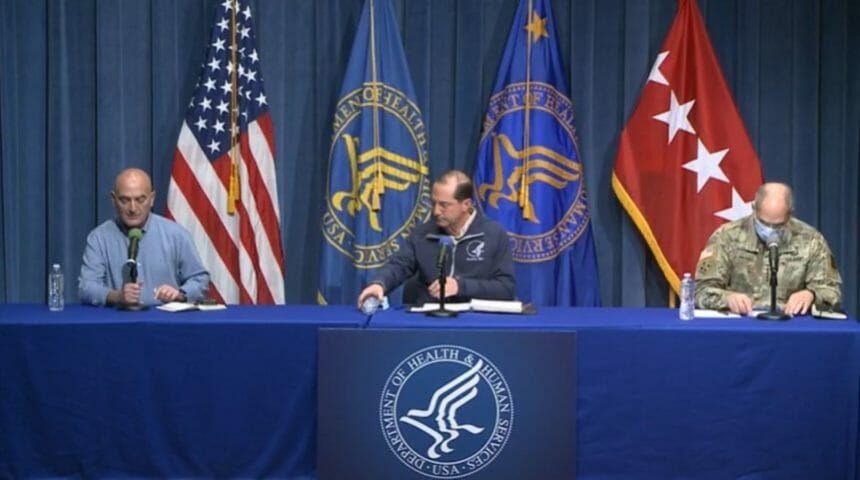
“This is the week we’ve been waiting for.”
LeadingAge President and CEO Katie Smith Sloan echoed the sentiments of the senior living industry during a membership call Monday as initial shipments of the Pfizer-BioNTech COVID-19 vaccine went out Monday across the country to states and jurisdictions, following Food and Drug Administration emergency use authorization Friday.
Operation Warp Speed Chief Science Adviser Moncef Slaoui, Ph.D., said Monday that 145 shipments of the Pfizer-BioNTech vaccine began arriving across states. Army Gen. Gustave Perna, chief operating officer of Operation Warp Speed, said the national distribution network operated smoothly over the weekend in a “methodical, disciplined, overwatched approach.”
Perna said states were given guidance about making healthcare workers and long-term care residents a top priority for the vaccine, adding that four states, in partnership with CVS Health and Walgreens, are ready to start scaling vaccines into long-term care facilities. More than 1,000 long-term care facilities will begin administering vaccinations as soon as Dec. 21, he said.
State priorities
A Kaiser Family Foundation review of states’ releases and statements about their vaccination priorities found that most states (45) are following the Centers for Disease Control and Prevention Advisory Committee on Immunization Practices recommendations for the highest priority group — healthcare workers and long-term care residents. Some states will start vaccinating both of these groups together, whereas others will begin with one group as they await more supply of vaccines.
The review found that a handful of states are including additional populations in the initial priority group. These populations include law enforcement personnel, prisoners and the homeless. More than 20 states are further segmenting the healthcare workers and long-term care resident group based on criteria including risk exposure and underlying health conditions, according to the Kaiser review.
Given expected ongoing vaccine supply limitations, most states still are developing plans for their later priorities. The main differences lie in where these states place people aged 65 and older and those with high-risk medical conditions, relative to essential workers.
Vaccine readiness
Argentum hosted a vaccine readiness briefing on Monday for members with representatives from the CDC, Walgreens and Omnicare, the long-term care pharmacy segment of CVS Health Company.
Ruth Link-Gelles, Ph.D., the CDC lead for the COVID-19 vaccine rollout in long-term care facilities, said that more than 40 states requested participation in the Pharmacy Partnership for Long-Term Care program, a voluntary federal program through which residents and staff members will be vaccinated against COVID-19 free of charge. She said the program will begin vaccinating staff and residents within a week.
For providers who have not registered for the federal Pharmacy Partnership program, Link-Gelles said “it’s too late” to participate. Many states, however, are providing additional doses to long-term care communities. She encouraged providers that are not part of the federal program to contact their state health departments, which are working on plans to ensure that both staff and residents are vaccinated.
$1.1 million employee incentive program
Meanwhile, Birmingham, AL-based Atlas Senior Living announced a $1.1 million COVID-19 employee vaccination incentive program on Monday.
The program will be offered to all full-time and part-time employees in Atlas’ 27 independent living, assisted living and memory care communities in Alabama, Florida, Georgia, Kentucky, South Carolina and Tennessee, in addition to its corporate office.
“We are putting our money where our mouth is,” Atlas President and co-CEO Scott Goldberg said. “The decision to initiate this program goes beyond the senior living and healthcare industries. This is a humanitarian decision.”
Goldberg added that Atlas trusts the technology, trials and science behind the vaccine and sees its incentive program as a “civic duty” to employees.
“When we say residents and associates’ safety are our utmost priority, we put action behind those words,” he said.
Vaccine attitudes
In related news, McLean, VA-based Sunrise Senior Living conducted a survey of residents and families and found that more than 92% of respondents would “definitely” or “probably” request the vaccine for themselves or their loved ones.
“The availability of a COVID-19 vaccine is a bright spot in an extremely challenging year for our residents, families and team members, and we are thrilled to see that residents and families share our excitement about this development,” said Sue Coppola, chief clinical officer at Sunrise. “There is still much work to do as we monitor states’ plans for the rollout of vaccine clinics across the country, but this data is extremely encouraging as we offer vaccination for residents in each Sunrise community.”
Sunrise, which offers assisted living, memory care, independent living and skilled nursing, found that more than 79% of resident and family respondents said they definitely plan to receive the vaccine themselves or plan to get their loved ones vaccinated. Eighty percent of survey respondents said they want to receive the vaccine “as soon as it is available for them.”
For those who indicated that they would participate in an upcoming vaccine clinic, the potential for side effects (47%) and vaccine effectiveness (30%) were the most common areas of interest.
According to Pew Research Center, 60% of all American said they would definitely or probably get a vaccine to prevent COVID-19.
Sunrise said it will encourage all residents and staff in its 275 communities to participate in the program.
War on the virus
Separately, Secretary of Health and Human Services Alex Azar said that states received $140 million from the CDC this week to assist in their planning for the vaccine.
“The war against the virus is not over yet, but this week we’re taking a major step toward our eventual victory,” he said.
Federal officials anticipate Moderna’s COVID-19 vaccine receiving emergency use authorization later this week for rollout to states as early as next week.




